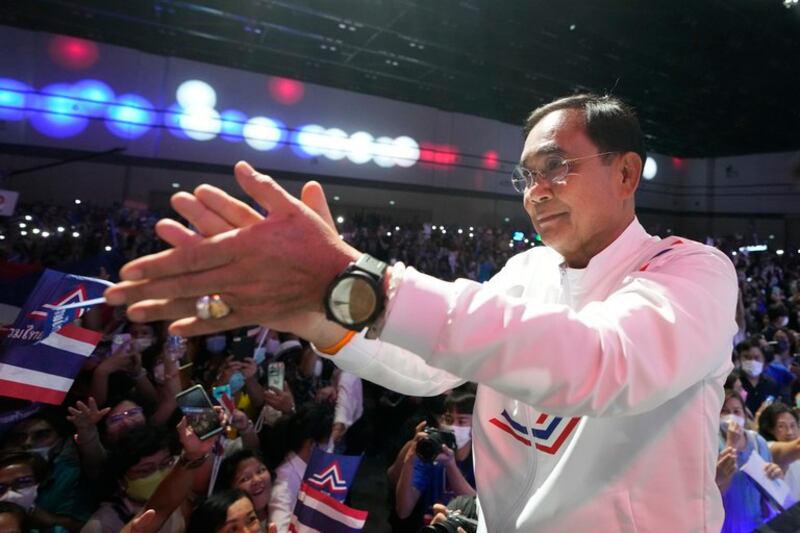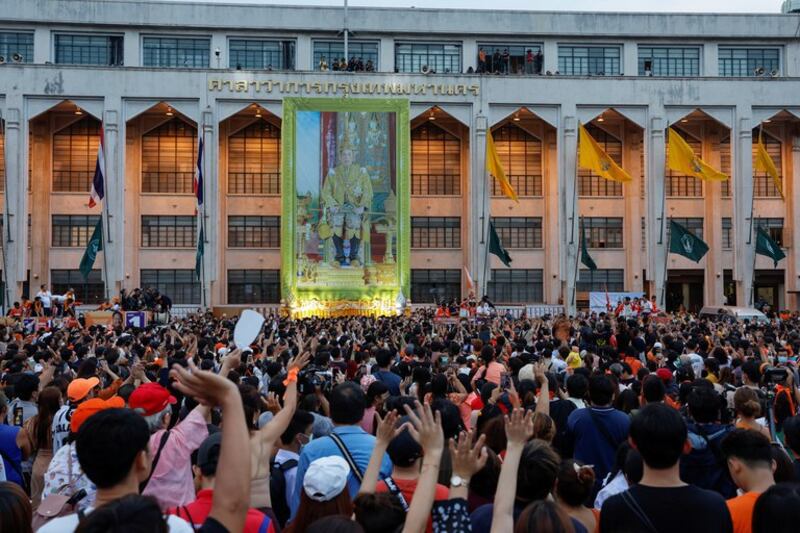The Thai people’s rejection of military-backed rule could not have been louder. The opposition scored an absolute rout in Sunday’s general election, with Move Forward unofficially winning 152 parliamentary seats and Pheu Thai claiming 141 seats.
The incumbents were totally humiliated. The two parties attached to the current government and led by the men who staged the 2014 coup, Prime Minister Prayuth Chan-o-cha of the United Thai Nation Party (UTN) and Prawit Wongsuwan of the Palang Pracharath Party (PPP), only garnered 76 out of 500 seats in Parliament’s lower house.
To put it into perspective, when people were given the choice to vote for only a party, nearly 70% of the electorate chose opposition parties. Only 1% chose the incumbent PPP while 13% selected Prayuth’s party.
Prawit himself was only elected from the party list, not directly elected. This was as thorough a rejection of the military’s involvement in politics as you could have.
Move Forward stole the show, poaching supporters from Pheu Thai, which underperformed even in its stronghold in the north. Move Forward thoroughly dominated Bangkok, winning 32 of 33 seats. In a year of anti-incumbency and a desire for real change, Pheu Thai was seen as being too status quo with not enough progressive economic policies.
Other parties had mixed performances.
The Democrat Party, Southeast Asia’s oldest political party, has never recovered from its endorsement of the 2006 coup and working relationship with the military since. Party leader Jurin Laksanawisit resigned to take responsibility for the party’s poor showing.
Bhumjaithai did well in voting for directly elected seats, especially in its stronghold, but got crushed on so-called party-list ballots. In other words, local politicians have their bases of support, but there is less support for the party and its policies.
What next?
If Thailand had a normal Westminster-style parliamentary system, Move Forward’s Pita Limjaroenrat would be given the opportunity to form a coalition government.
He vowed to do just that with Pheu Thai as he announced efforts to build a six-party coalition.
But Thailand isn’t a normal Westminster system. Remember, Pheu Thai received a plurality of the vote in 2019, but didn’t get a chance to form a government, either.
As part of the military’s attempt to stave off opposition rule, the 250 members of the military-appointed Senate get to vote for the prime minister.
That body includes the six top military leaders, and one-third of Senators are uniformed military – i.e. they are still under the chain of command, regardless of Senate rules that say they can vote as individuals.
The civilians are a mix of retired military officers and ultra-royalists, who have already stated their reservations about Pita and Move Forward. Sen. Kittisak Rattanawaraha, for example, insinuated that Pita has not demonstrated sufficient loyalty to the royal institution to become prime minister.
As such, an opposition-led coalition needs 376 lower house seats to overcome a Senate veto.
Pita contends that in the face of an overwhelming mandate, the Senate would have to endorse the popular will.
That is naive. The Senate was created and appointed to do one thing: maintain a conservative-royalist hold on politics. While a handful of Senators have indicated they will endorse the elected parties, it is unlikely that the overwhelming majority will do so.

Why would the elites backing the military and monarchy unilaterally give up the Senate’s role in selecting the prime minister when doing so would hand the government over to the opposition, one of whose parties is in favor of significant reforms to the monarchy, including amending Article 112 (Lèse-Majesté)?
Why would the Senate endorse a party that seeks to amend the military-drafted constitution of 2017? Why would the military allow a party that plans to abolish conscription to rule?
For those elites, democracy is an existential threat, as it’s a gateway to republicanism. They are not going to unilaterally cede the tools they have wielded to consolidate power.
Could Pita be disqualified?
Pita and other leaders of Move Forward have a swath of existing legal cases against them. Any one of them could be disqualified by the Election Commission, which is not an independent body. Indeed, the party itself could be dissolved, as a PPP legislator asked a court to do last week. Any citizen can file Lèse-Majesté charges.
Recall that courts dissolved the opposition Future Forward Party after its electoral win in 2019, and stripped its leader, Thanathorn Juangroongruangkit, of his parliamentary seat, before hounding him with a myriad of lawsuits.
The Election Commission (EC) has 60 days to conduct investigations and potentially disqualify elected MPs and/or dissolve parties if they find significant problems. The EC and courts have never dissolved a pro-military party despite irregularities and criminal behavior.
The EC will leave no stone unturned. Sadly, the EC, which deserves credit for its competent running of elections, is also a tool that can be used to undermine those very elections.
In short, hopes of an opposition-led government are based on the assumption that the military, the Senate, and the Election Commission are good-faith actors who will endorse the parties with a popular mandate, and not protect their vested interests.
So is there a pathway forward for the opposition to form a government? That gets trickier.
Pita has steadfastly refused to form a government with any party tied to the military or the 2014 coup.

His coalition could try to woo Bhumjaithai, with its 70 seats. Its leader, Anutin Charnvirakul, had previously been a member of Pheu Thai and the party, the third largest, has some crossover appeal.
But Anutin would reject Move Forward’s policies on monarchy reform, and it’s unclear whether Pita would make such a compromise on a core issue so soon.
It’s also hard to see the royalist elites not pressuring Anutin to turn down such an offer, and sweetening the deal should he join a conservative coalition. Regardless, Bhumjaithai is the kingmaker party in this election.
In sum, it was a rout in terms of the popular vote; but that won’t necessarily translate into a governing coalition. A conservative coalition between Bhumjaithai, the PPP, United Thai Nation Party, and the Democrat Party is far more likely to form a government with overwhelming Senate backing is a real possibility, and one that would lead to massive street protests.
A conservative coalition between Bhumjaithai, the PPP, United Thai Nation Party, and the Democrat Party is far more likely to form a government with full Senate backing.
While the opposition won big, in Thai politics often it’s loser takes all.
Zachary Abuza is a professor at the National War College in Washington and an adjunct at Georgetown University. The views expressed here are his own and do not reflect the position of the U.S. Department of Defense, the National War College, Georgetown University or Radio Free Asia.
